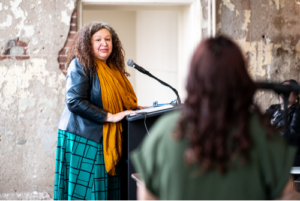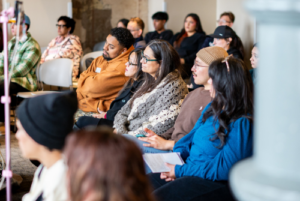
Metropolitan State University of Denver’s Gender Institute for Teaching and Advocacy hosted writer, scholar and activist Lorgia García Peña, Ph.D., on April 18 for the 32nd Annual Bridge Speaker event. The event, originally scheduled for February, typically serves as a bridge between Black History Month in February and Women’s History Month in March and welcomes visiting educators and leaders to campus for conversation and community.
“The Bridge Speaker is one of the longest-standing events at MSU Denver and seeks to honor the importance of intersectionality and amplify the voices of Black women in history,” said Netty Rodriguez Arauz, associate director of GITA.
García Peña is a distinguished scholar in Latinx studies and an advocate and author studying colonialism, migration and diaspora with an emphasis on Black Latinx communities. Her work deliberately highlights the social, political and cultural contributions of people who have been erased from traditional archives.
Remembering history

Addressing a crowd of MSU Denver students and employees, García Peña focused on memory, remembrance and how memories themselves operate. As an example, she observed that while many people remember the defiance, resistance and ultimate killing of the Mirabal sisters under former Dominican Republic President Rafael Trujillo’s dictatorship, the thousands of uncounted others who were slain under the regime are forgotten.
“These are voices that were lost,” she said.
Honoring struggle
A scholar on the Black diaspora, García Peña also spoke of honoring trailblazing women in history, specifically about how Black migrant Dominican women in Italy made contributions to history and society. Through their organization Anacaona, García Peña said, “Their rebelling was on the grounds of care — the most simple and basic form of feminism.”
Learn more about García Peña
García Peña’s work is concerned with the ways in which anti-Blackness and xenophobia intersect in the Global North, producing categories of exclusion that lead to violence and erasure. Her research highlights the knowledge and cultural, social and political contributions of people who have been silenced from traditional archives, paying attention to the intersections of Blackness, colonialism and migration and centering Black Latinx lives.
She is the author of three award-winning books: “The Borders of Dominicanidad: Race, Nations and Archives of Contradictions”; “Translating Blackness: Latinx Colonialities in Global Perspective”; and “Community as Rebellion.”

